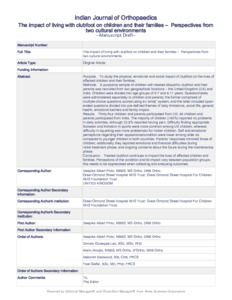Pinto, D; Leo, DG; Aroojis, A; Eastwood, D; Gelfer, Y
(2022)
The Impact of Living with Clubfoot on Children and Their Families: Perspectives from Two Cultural Environments.
Indian J Orthop, 56 (12).
pp. 2193-2201.
ISSN 0019-5413
https://doi.org/10.1007/s43465-022-00748-8
SGUL Authors: Gelfer, Yael
![[img]](https://openaccess.sgul.ac.uk/115072/1.hassmallThumbnailVersion/JOIO-S-22-00918-4.pdf)  Preview |
|
PDF
Accepted Version
Available under License ["licenses_description_publisher" not defined].
Download (2MB)
| Preview
|
Abstract
PURPOSE: To study the physical, emotional and social impact of clubfoot on the lives of affected children and their families. METHODS: A purposive sample of children with treated idiopathic clubfoot and their parents was recruited from two geographical locations-the United Kingdom (UK) and India. Children were divided into age groups of 5-7 and 8-11 years. Questionnaires were administered separately to children and parents; the former comprised multiple-choice questions scored using an 'emoji' system, and the latter included open-ended questions divided into pre-defined themes of daily limitations, social life, general health, emotional barriers and family impact. RESULTS: Thirty-four children and parents participated from UK; 96 children and parents participated from India. The majority of children (> 80%) reported no problems in daily activities, although 32.8% reported having pain. Difficulty finding appropriate footwear and limitation in sports were more common among UK children, whereas difficulty in squatting was more problematic for Indian children. Self and emotional perceptions regarding their appearance/condition were lower among older as compared to younger children in both countries. Parents' responses mirrored those of children; additionally they reported emotional and financial difficulties during initial treatment phase, and ongoing concerns about the future during the maintenance phase. CONCLUSION: Treated clubfoot continues to impact the lives of affected children and families. Perceptions of the condition and its impact vary between population groups; this needs to be appreciated when collecting and analysing outcomes.
| Item Type: |
Article
|
| Additional Information: |
This version of the article has been accepted for publication, after peer review (when applicable) and is subject to Springer Nature’s AM terms of use, but is not the Version of Record and does not reflect post-acceptance improvements, or any corrections. The Version of Record is available online at: http://dx.doi.org/10.1007/s43465-022-00748-8 |
| Keywords: |
Clubfoot, Congenital talipes equinovarus, Outcomes, Ponseti, Clubfoot, Congenital talipes equinovarus, Ponseti, Outcomes, Clubfoot, Congenital talipes equinovarus, Outcomes, Ponseti, 11 Medical and Health Sciences |
| SGUL Research Institute / Research Centre: |
Academic Structure > Institute of Medical, Biomedical and Allied Health Education (IMBE) |
| Journal or Publication Title: |
Indian J Orthop |
| ISSN: |
0019-5413 |
| Language: |
eng |
| Publisher License: |
Publisher's own licence |
| PubMed ID: |
36507216 |
| Web of Science ID: |
WOS:000857870900001 |
| Dates: |
| Date |
Event |
| 2022-12 |
Published |
| 2022-09-20 |
Published Online |
| 2022-09-06 |
Accepted |
|
 |
Go to PubMed abstract |
| URI: |
https://openaccess.sgul.ac.uk/id/eprint/115072 |
| Publisher's version: |
https://doi.org/10.1007/s43465-022-00748-8 |
Statistics
Item downloaded times since 19 Dec 2022.
Actions (login required)
 |
Edit Item |



